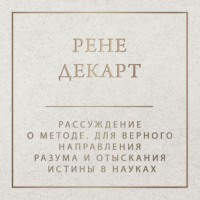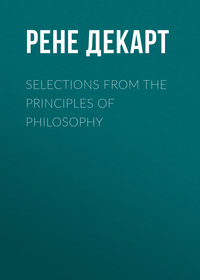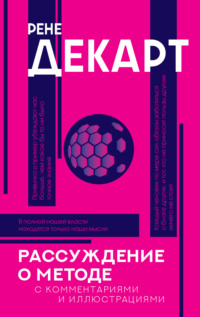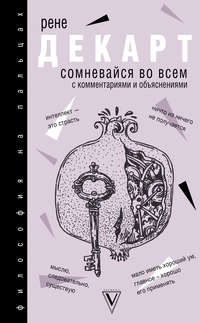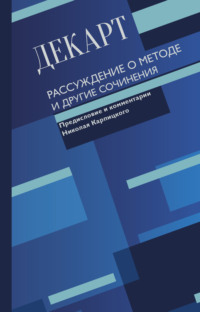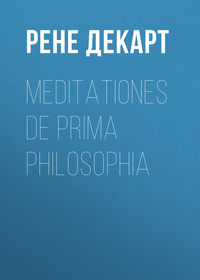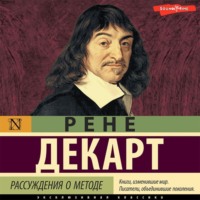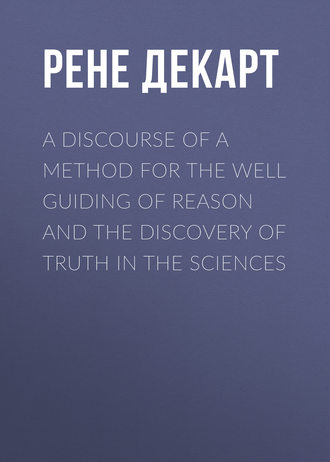 полная версия
полная версияA Discourse of a Method for the Well Guiding of Reason and the Discovery of Truth in the Sciences
And for my part, I had undoubtedly been of the number of those latter, had I never had but one Master, or had I not known the disputes which have alwayes hapned amongst the most learned. For having learnt from the very School, That one can imagin nothing so strange or incredible, which had not been said by some one of the Philosophers; And having since observ’d in my travails, That all those whose opinions are contrary to ours, are not therefore barbarous or savage, but that many use as much or more reason then we; and having consider’d how much one Man with his own understanding, bred up from his childhood among the French or the Dutch, becomes different from what he would be, had he alwayes liv’d amongst the Chineses, or the Cannibals: And how even in the fashion of our Clothes, the same thing which pleas’d ten years since, and which perhaps wil please ten years hence, seems now to us ridiculous and extravagant. So that it’s much more Custome and Example which perswades us, then any assured knowledg; and notwithstanding that plurality of voices is a proof of no validity, in those truths which are hard to be discovered; for that it’s much more likely for one man alone to have met with them, then a whole Nation; I could choose no Man whose opinion was to be preferr’d before anothers: And I found my self even constrain’d to undertake the conduct of my self.
But as a man that walks alone, and in the dark, I resolv’d to goe so softly, and use so much circumspection in all things, that though I advanc’d little, I would yet save my self from falling. Neither would I begin quite to reject, some opinions, which formerly had crept into my belief, without the consent of my reason, before I had employed time enough to form the project of the work I undertook, and to seek the true Method to bring me to the knowledg of all those things, of which my understanding was capable.
I had a little studyed, being young, of the parts of Philosophy, Logick, and of the Mathematicks, the Analysis of the Geometricians, and Algebra: Three arts or sciences which seem’d to contribute somewhat conducing to my designe: But examining them, I observ’d, That as for Logick, its Sylogisms, and the greatest part of its other Rules, serve rather to expound to another the things they know, or even as Lullies art, to speak with judgment of the things we are ignorant of, then to learn them. And although in effect it contain divers most true and good precepts, yet there are so many others mixed amongst them, either hurtfull or superfluous, That it’s even as difficult to extract them, as ’tis to draw a Diana or a Mercury out of a lump of Marble, which is not yet rough-hewn; as for the Analysis of the Ancients, and the Algebra of the Moderns; besides that, they extend only to matters very abstract, and which seem to be of no use; The first being alwayes so tyed to the consideration of figures, That it cannot exercise the understanding, without very much tiring the imagination. And in the latter they have so subjected themselves to certain Rules and cyphers, that they have made a confus’d and obscure art which perplexeth the minde, in stead of a Science to instruct it. For this reason, I thought I ought to seek some other Method, which comprehending the advantages of these, they might be exempt from their defects. And as the multitude of Laws often furnisheth excuses for vice; so a State is fair better polic’d, when having but a few, they are very strictly observ’d therein: So, instead of the great many precepts whereof Logick is compos’d, I thought these four following would be sufficient for me, if I took but a firm and constant resolution not once to fail in the observation of them.
The first was, never to receive any thing for true, but what I evidently knew to be so; that’s to say, Carefully to avoid Precipitation and Prevention, and to admit nothing more into my judgment, but what should so clearly and distinctly present it self to my minde, that I could have no reason to doubt of it.
The second, to divide every One of these difficulties, which I was to examine into as many parcels as could be, and, as was requisite the better to resolve them.
The third, to lead my thoughts in order, beginning by the most simple objects, and the easiest to be known; to rise by little and little, as by steps, even to the knowledg of the most mixt; and even supposing an Order among those which naturally doe not precede one the other.
And the last, to make every where such exact calculations, and such generall reviews, That I might be confident to have omitted Nothing.
Those long chains of reasons, (though simple and easie) which the Geometricians commonly use to lead us to their most difficult demonstrations, gave me occasion to imagine, That all things which may fall under the knowledg of Men, follow one the other in the same manner, and so we doe only abstain from receiving any one for true, which is not so, and observe alwayes the right order of deducing them one from the other, there can be none so remote, to which at last we shall not attain; nor so hid, which we shall not discover. Neither was I much troubled to seek by which it behooved me to begin, for I already knew, that it was by the most simple, and the easiest to be discern’d. But considering, that amongst all those who formerly have sought the Truth in Learning, none but the Mathematicians only could finde any demonstrations, that’s to say, any certain and evident reasons. I doubted not, but that it was by the same that they have examin’d; although I did hope for no other profit, but only that they would accustome my Minde to nourish it self with Truths, and not content it self with false Reasons. But for all this, I never intended to endevour to learn all those particular Sciences which we commonly call’d Mathematicall; And perceiving, that although their objects were different, yet did they nevertheless agree altogether, in that they consider no other thing, but the divers relations or proportions which are found therein; I thought it therefore better to examine those proportions in generall, and without supporting them but in those subjects, which might the more easily serve to bring me to the knowledg of them. But withall, without any wayes limiting them, That I might afterwards the better sit them to all others whereto they might be applyed. Having also observ’d, That to know them, it would be sometimes needfull for me to consider every one in particular, or sometimes only to restrain them, or comprehend many together; I thought, that to consider them the better in particular I ought to suppose them in lines, for as much as I find nothing more simple, nor which I could more distinctly represent to my imagination, and to my sences; But to hold or comprehend many in one, I was oblig’d to explain them by certain Cyphers the shortest I possibly could, and that I should thereby borrow the best of the Geometricall Analysis, and of Algebra, & so correct all the defects of the one by the other.
As in effect I dare say, That the exact observation of those few precepts I had chosen, gave me such a facility to resolve all the questions whereto these two sciences extend; That in two or three months space which I employed in the examination of them, having begun by the most simple and most generall, and every Truth which I found being a rule which afterwards served me to discover others; I did not only compasse divers truths which I had formerly judged most difficult, But me thought also that towards the end I could determin even in those which I was ignorant of, by what means and how farr it was possible to resolve them. Wherein perhaps I shall not appear to be very vain if you consider, That there being but one truth of every thing, who ever finds it, knows as much of it as one can know; And that for example a child instructed in Arithmatick having made an addition according to his rules, may be sure to have found, touching the sum he examined, all what the wit of man could finde out. In a word the method which teacheth to folow a right order, and exactly to enumerate all the circumstances of what we seek, contains, whatsoever ascertains the rules of Arithmatick.
But that which pleas’d me most in this Method was the assurance I had, wholly to use my reason, if not perfectly, at least as much as it was in my power; Besides this, I perceived in the practice of it, my minde by little and little accustom’d it self to conceive its objects more clearly and distinctly; and having not subjected it to any particular matter, I promised my self to apply it also as profitable to the difficulties, of other sciences as I had to Algebra: Not that I therefore durst at first undertake to examine all which might present themselves, for that were contrary to the order it prescribes. But having observ’d that all their principles were to be borrowed from Philosophy, in which I had yet found none that were certain, I thought it were needfull for me in the first place to endevor to establish some, and that this being the most important thing in the world, wherein precipitation and prevention were the most to be feared, I should not undertake to performe it, till I had attain’d to a riper Age then XXIII. which was then mine. Before I had formerly employed a long time in preparing my self thereunto, aswel in rooting out of my minde all the ill opinions I had before that time received, as in getting a stock of experience to serve afterwards for the subject of my reasonings, and in exercising my self always in the Method I had prescribed. That I might the more and more confine my self therein.
PART. III
but as it is not enough to pull down the house where we dwell, before we begin to re-edify it, and to make provision of materials and architects, or performe that office our selves; nor yet to have carefully laid the design of it; but we must also have provided our selves of some other place of abode during the time of the rebuilding: so that I might not remain irresolute in my actions, while reason would oblige me to be so in my judgments, and that I might continue to live the most happily I could, I form’d for my own use in the interim a moral, which consisted but of three or four maximes, which I shall communicate unto you.
The first was to obey the lawes and customes of my Country, constantly adhæring to that Religion wherein by the grace of God I had from mine infancy bin bred. And in all other things behaving my self according to the most moderate opinions and those which were farthest from excesse, which were commonly received in practice by the most judicious Men, amongst whom I was to live: For beginning from that very time, to reckon mine own for nothing, because I could bring them all to the test, I was confident I could not do better then follow those of the deepest sense; and although perhaps there are as understanding men amongst the Persians or Chineses as amongst us, yet I thought it was more fit to regulate my self by those with whom I was to live, and that I might truly know what their opinions were, I was rather to observe what they practic’d, then what they taught. Not only by reason of the corruption of our manners, there are but few who will say, all they beleeve, but also because divers are themselves ignorant of it; for the act of the thought by which we beleeve a thing, being different from that whereby we know that we believe it, the one often is without the other. And amongst divers opinions equally receiv’d, I made choise of the most moderate only, as well because they are always the most fit for practice, and probably the best, all excess being commonly ill; As also that I might less err from the right way, if I should perhaps miss it, then if having chosen one of the extremes, it might prove to be the other, which I should have followed. And particularly I plac.rs d amongst extremities, all those promises by which we somwhat restrain our liberty. Not that I disapproved the laws, which to cure the inconstancy of weak minds, permit us when we have any good design, or else for the preservation of Commerce, one that is but indifferent, to make vows or contracts, which oblige us to persevere in them: But because I saw nothing in the world remain always in the same state; and forming own particular, promised my self to perfect more and more my judgment, and not to impair it, I should have thought my self guilty of a great fault against right understanding, if because I then approved any thing, I were also afterwards oblig’d to take it for good, when perhaps it ceased to be so, or that I had ceased to esteem it so.
My second Maxime was, To be the most constant and resolute in my actions that I could; and to follow with no less perseverance the most doubtfull opinions, when I had once determined them, then if they had been the most certain. Imitating herein Travellers, who having lost their way in a Forrest, ought not to wander, turning now this way, and then that, and less to abide in one place; but stil advance straight forwards, towards one way, and not to change on slight occasions, although perhaps at first Chance only mov’d them to determine that choice: For by that means, if they do not go directly whither they desire, they will at least arrive somewhere where they will probably be better then in the midst of a Forrest. So the actions of this life admitting often of no delay, its a most certain Truth, That when it is not in our power to discern the truest opinions, we are to follow the most probable: Yea, although we finde no more probability in the one then in the other, we yet ought to determine some way, considering them afterwards no more as doubtful in what they relate to practice; but as most true and certain; forasmuch as the reason was so, which made us determine it. And this was sufficient for that time to free me from all the remorse and repentance which useth to perplex the consciences of those weak and staggering minds, which inconstantly suffer themselves to passe to the practice of those things as good, which they afterwards judge evill.
My third Maxime was, To endevour always rather to conquer my self then Fortune; and to change my desires, rather then the order of the world: and generally to accustome my self to beleeve, That there is nothing wholly in our power but our thoughts; so that after we have done our best, touching things which are without us, all whats wanting of success in respect of us is absolutely impossible. And this alone seem’d sufficient to hinder me from desiring any thing which I could not acquire, and so to render me content. For our will naturally moving us to desire nothing, but those things which our understanding presents in some manner as possible, certain it is, that if we consider all the good which is without us, as equally distant from our power, we should have no more regret for the want of those which seem due to our births, when without any fault of ours we shall be deprived of them, then we have in wanting the possessions of the Kingdoms of China or Mexico. And making (as we say) vertue of necessity, we should no more desire to be in health being sick, or free being in prison, then we now do, to have bodies of as incorruptible a matter as diamonds, or wings to fly like birds. But I confess, that a long exercise, and an often reiterated meditation, is necessary to accustom us to look on all things with that byass: And I beleeve, in this principally consists, the secret of those Philosophers who formerly could snatch themselves from the Empire of Fortune, and in spight of pains and poverty, dispute felicity with their Gods, for imploying themselves incessantly in considering the bounds which Nature had prescribed them, they so perfectly perswaded themselves, That nothing was in their power but their thoughts, that, that onely was enough to hinder them from having any affection for other things. And they disposed so absolutely of them, that therein they had some reason to esteem themselves more rich and powerfull, more free and happy then any other men; who wanting this Philosophy, though they were never so much favoured by Nature and Fortune, could never dispose of all things so well as they desired.
Lastly, To conclude these Morals, I thought fit to make a review of mens severall imployments in this life, that I might endeavour to make choice of the best, and without prejudice to other mens, I thought I could not do better then to continue in the same wherein I was, that is, to imploy all my life in cultivating my Reason, and advancing my self, as far as I could in the knowledge of Truth, following the Method I had prescribed myself. I was sensible of such extreme contentment since I began to use this Method, that I thought none could in this life be capable of any more sweet and innocent: and daily discovering by means thereof, some Truths which seemed to me of importance, and commonly such as other men were ignorant of, the satisfaction I thereby received did so possesse my minde, as if all things else concern’d me not. Besides, that the three preceding Maximes were grounded only on the designe I had, to continue the instruction of my self. For God having given to every one of us a light to discern truth from falsehood, I could not beleeve I ought to content my self one moment with the opinions of others, unlesse I had proposed to my self in due time to imploy my judgment in the examination of them. Neither could I have exempted my self from scruple in following them, had I not hoped to lose no occasion of finding out better, if there were any.
But to conclude, I could not have bounded my desires, nor have been content, had I not followed a way, whereby thinking my self assured to acquire all the knowledge I could be capable of: I thought I might by the same means attain to all that was truly good, which should ever be within my power; forasmuch as our Will inclining it self to follow, or fly nothing but what our Understanding proposeth good or ill, to judge well is sufficient to do well, and to judge the best we can, to do also what’s best; to wit, to acquire all vertues, and with them all acquirable goods: and whosoever is sure of that, he can never fail of being content.
After I had thus confirmed my self with these Maximes, and laid them up with the Articles of Faith, which always had the first place in my Belief, I judg’d that I might freely undertake to expell all the rest of my opinions. And forasmuch as I did hope to bring it the better to passe by conversing with men, then by staying any longer in my stove, where I had had all these thoughts: before the Winter was fully ended, I returned to my travels; and in all the nine following yeers I did nothing but rowl here and there about the world, endeavouring rather to be a spectator, then an actor in all those Comedies which were acted therein: and reflecting particularly on every subject which might render it suspected, or afford any occasion mistake. In the mean time I rooted out of my minde all those errours which formerly had crept in. Not that I therein imitated the Scepticks, who doubt onely to the end they may doubt, and affect to be always unresolved: For on the contrary, all my designe tended onely to fix my self, and to avoid quick-mires and sands, that I might finde rock and clay: which (me thought) succeeded well enough; forasmuch as, seeking to discover the falshood or uncertainty of those propositions I examined, (not by weak conjectures, but by clear and certain ratiocinations) I met with none so doubtfull, but I thence drew some conclusion certain enough, were it but onely this, That it contained nothing that was certain. And as in pulling down an old house, commonly those materials are reserved which may serve to build a new one; so in destroying all those my opinions which I judg’d ill grounded, I made divers observations, and got severall experiences which served me since to establish more certain ones. And besides I continued to exercise my self in the Method I had prescribed.
For I was not only carefull to direct all my thoughts in generall according to its rules, but I from time to time reserv’d some houres, which I particularly employd to practice it in difficulties belonging to the Mathematicks, loosening from all the principles of other Sciences, which I found not stable enough, as you may see I have done in divers explain’d in my other following discourses. And thus not living in appearance otherwise then those who having no other business then to lead a sweet and innocent life, study to separate pleasures from vices, and use honest recreations to enjoy their ease without wearinesse; I did not forbear to pursue my design, and advance in the knowledg of truth, perhaps more, then if I had done nothing but read books or frequent learned men.
Yet these nine years were vanished, before I had engaged my self in those difficulties which use to be disputed amongst the learned; or begun to seek the grounds of any more certain Philosophy then the Vulgar: And the example of divers excellent Men who formerly having had the same designe, seem’d not to me to have succeeded therein, made me imagine so much difficulty, that I had not perhaps dar’d so quickly to have undertaken it, had I not perceiv’d that some already had given it out that I had already accomplished it. I know not whereupon they grounded this opinion, and if I have contributed any thing thereto by my discourse, it must have been by confessing more ingeniously what I was ignorant of, then those are wont to do who have a little studyed, and perhaps also by comunicating those reasons, I had to doubt of many things which others esteem’d most eminent, rather then that I bragg’d of any learning. But having integrity enough, not to desire to be taken for what I was not, I thought that I ought to endeavour by all means to render my self worthy of the reputation which was given me. And ’tis now eight years since this desire made me resolve to estrange my self from all places where I might have any acquaintance, and so retire my self hither in a Country where the long continuance of the warre hath established such orders, that the Armies which are intertain’d there, seem to serve onely to make the inhabitants enjoy the fruits of peace with so much the more security; and where amongst the croud of a great people more active and solicitous for their own affaires, then curious of other mens, not wanting any of those necessaries which are in the most frequented Towns, I could live as solitary and retired as in the most remote deserts.
PART. IV
I Know not whether I ought to entertain you with the first Meditations which I had there, for they are so Metaphysicall and so little common, that perhaps they will not be relished by all men: And yet that you may judge whether the foundations I have laid are firm enough, I find my self in a manner oblig’d to discourse them; I had long since observed that as for manners, it was somtimes necessary to follow those opinions which we know to be very uncertain, as much as if they were indubitable, as is beforesaid: But because that then I desired onely to intend the search of truth, I thought I ought to doe the contrary, and reject as absolutely false all wherein I could imagine the least doubt, to the end I might see if afterwards any thing might remain in my belief, not at all subject to doubt. Thus because our senses sometimes deceive us, I would suppose that there was nothing which was such as they represented it to us. And because there are men who mistake themselves in reasoning, even in the most simple matters of Geometry, and make therein Paralogismes, judging that I was as subject to fail as any other Man, I rejected as false all those reasons, which I had before taken for Demonstrations. And considering, that the same thoughts which we have waking, may also happen to us sleeping, when as not any one of them is true. I resolv’d to faign, that all those things which ever entred into my Minde, were no more true, then the illusions of my dreams. But presently after I observ’d, that whilst I would think that all was false, it must necessarily follow, that I who thought it, must be something. And perceiving that this Truth, I think, therefore, I am, was so firm and certain, that all the most extravagant suppositions of the Scepticks was not able to shake it, I judg’d that I might receive it without scruple for the first principle of the Philosophy I sought.
Examining carefully afterwards what I was; and seeing that I could suppose that I had no body, and that there was no World, nor any place where I was: but for all this, I could not feign that I was not; and that even contrary thereto, thinking to doubt the truth of other things, it most evidently and certainly followed, That I was: whereas, if I had ceas’d to think, although all the rest of what-ever I had imagined were true, I had no reason to beleeve that I had been. I knew then that I was a substance, whose whole essence or nature is, but to think, and who to be, hath need of no place, nor depends on any materiall thing. So that this Me, to wit, my Soul, by which I am what I am, is wholly distinct from the Body, and more easie to be known then it; and although that were not, it would not therefore cease to be what it is.


